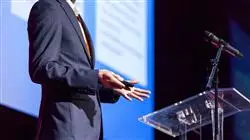University certificate
The world's largest faculty of journalism and communication”
Introduction to the Program
The management of events and protocol is a professional field that requires a high qualification, so this Postgraduate diploma has been designed to help students to acquire the necessary knowledge”

The Postgraduate diploma in Event and Protocol Management is a highly qualified tool for professionals in the field, who will find in a single program, the most complete knowledge in Event and Protocol Management. In this way, through a highly competent syllabus, the students able to take a solid and solvent step in this field, achieving the personal and professional skills necessary to act as expert in the field.
This program will also include the fundamentals of Public Relations, a discipline which has an essential presence within organizations because it contributes to the strategic management of any organization's communication. The essence of Public Relations consists of knowing, managing and investigating the different audiences that an organization has.
In addition, a journey through the history of advertising and public relations will be made, offering the students an up-to-date program on the evolution of the fascinating world of persuasive communication. Using the synthesis capacity of advertising, this field offers a decentralized perspective of the evolution of persuasive communication, with special emphasis on national and international advertising communication. The historical study of persuasive communication may well be a determining factor with regards to understanding all of the current processes typical of advertising and public relations.
In short, students are offered the possibility of an immersive study in an area of great interest and relevance today, which is essential in any company that must create and manage their own events. A program that will mark a before and after in your preparation, allowing them to access job positions of great demand.
Join the professional elite with the completion of this Postgraduate diploma, thanks to which you will be able to develop your skills in this field”
This Postgraduate diploma in Event and Protocol Management contains the most complete and up-to-date program on the market. The most important features include:
- The use of the latest technology in e-learning software
- The intensely visual teaching system, supported by graphic and schematic contents that are easy to assimilate and understand
- Practical case studies presented by practising experts
- State-of-the-art interactive video systems
- Teaching supported by telepractice
- Continuous updating and recycling systems
- Self-regulated learning, which makes the program completely compatible with other commitments
- Practical exercises for self-assessment and learning verification
- Support groups and educational synergies: questions to the expert, debate and knowledge forums
- Communication with the teaching team and individual reflection work.
- Content that is accessible from any fixed or portable electronic device with an Internet connection
- Complementary resource banks that are permanently available
Thanks to the telepractice, the student will have the opportunity to learn through an immersive experience, which will provide a faster integration and a much more realistic view of the contents”
The teaching staff of this program is made up of professionals from different fields related to this specialty. As such, TECH can fulfill its academic updating objective. A multidisciplinary team of experienced professionals in different environments, who will develop theoretical knowledge efficiently, but above all, will put their practical knowledge derived from their own experience at the students’ service.
This mastery of the subject matter is complemented by the effectiveness of the methodological design. Developed by a multidisciplinary team of e-learning experts, it integrates the latest advances in educational technology. As a result, students will be able to study with a range of comfortable and versatile multimedia tools that will give them the operational capacity they need in their study process.
The design of this program is centered on Problem-Based Learning. An approach that conceives learning as a highly practical process. To achieve this remotely, telepractice is used. Therefore, with the help of an innovative interactive video system, and Learning from an Expert, the students will be able to acquire the knowledge as if they were facing the very cases being studied. A concept that will allow students to integrate and memorize what they have learnt in a more realistic and permanent way.
Know the rules of protocol that must be taken into account in each event and apply them safely and effectively"

By completing this Postgraduate diploma, you will acquire the necessary preparation to manage top-level events"
Syllabus
The contents of this Postgraduate diploma in Event and Protocol Management have been developed by different experts with a clear purpose: to ensure that our students acquire each and every one of the skills necessary to become real specialists in this field. A very complete and well-structured program that will lead professionals to the highest standards of quality and success, and will achieve this through the quality of its syllabus, its faculty and its innovative teaching methodology.

The best program of the current university scenario, at your disposal in TECH”
Module 1. Fundamentals of Public Relations
1.1. Theoretical Framework of Public Relations
1.1.1. Introduction
1.1.2. Public Relations Research
1.1.3. Main Public Relations Theorists
1.1.4. Public Relations and Related Items
1.1.5. Definition of Public Relations
1.2. Evolution Over Time
1.2.1. Stages
1.2.2. The Origin of Public Relations
1.2.3. Trends in Public Relations
1.3. External Communication
1.3.1. Characteristics and Audiences
1.3.2. Media Relations
1.3.3. Provision of Information
1.4. Internal Communication
1.4.1. Introduction
1.4.2. Functions and Objectives
1.4.3. Types of Internal Communication
1.4.4. Internal Communication Tools
1.5. Public Relations and Public Opinion
1.5.1. Powerful Media Image
1.5.2. The limited Influence of the Media
1.5.3. Structural Effects on the Company
1.6. International Public Relations
1.6.1. Characteristics of the International Society
1.6.2. Definition
1.6.3. The Role of International Public Relations
1.6.4. Types of Actions
1.7. Public Relations and Crisis
1.7.1. The Organization in the Face of a Crisis
1.7.2. Characteristics of Crises
1.7.3. Crisis Typologies
1.8. Stages of Crisis
1.8.1. Preliminary Phase
1.8.2. Acute Phase
1.8.3. Chronic Phase
1.8.4. Post-traumatic Phase
1.9. Preparation of a Crisis Plan
1.9.1. Analysis of Possible Problems
1.9.2. Planning
1.9.3. Adequacy of Personnel
1.10. Communication Technologies in Crises
1.10.1. Advantages
1.10.2. Disadvantages
1.10.3. Data Science
Module 2. History of Advertising and Public Relations
2.1. Advertising Activity before the Printing Press
2.1.1. Advertising in its Most Primitive Forms
2.1.2. First Manifestations
2.1.3. The Old World
2.2. From the Printing Press to the Industrial Revolution
2.2.1. Some Aspects that Contributed to the Emergence of the Printing Press in Europe
2.2.2. First Expressions: Brochures and Posters
2.2.3. Brands and Labels
2.2.4. The Loud and Talkative Advertisements
2.2.5. The Sign and the Commercial Mural
2.2.6. The Birth of a New Media
2.2.7. Communication and Power: Controlling Persuasion
2.3. The Revolutions
2.3.1. Advertising and the Industrial Revolution
2.3.2. The Long and Tortuous Road to Press Freedom
2.3.3. From Propaganda to Advertising
2.3.4. Propaganda and Political Advertising: Concepts
2.3.5. Characteristics of this Advertisement
2.3.6. The Industrial Revolution in the Birth of Commercial Advertising
2.4. Birth of Advertising
2.4.1. The Origin of Commercial Advertising
2.4.2. The Technological Revolution
2.4.3. Printing Systems
2.4.4. The Paper
2.4.5. Photography
2.4.6. The Telegraph
2.4.7. Print Advertising
2.4.8. Posters
2.5. Consolidation of Advertising Activity
2.5.1. Economic Factors between 1848-1914
2.5.2. New Forms of Commercialization
2.5.3. Newspapers
2.5.4. Magazines
2.5.5. The Art of the Poster
2.5.6. Fundamentals of Modern Advertising
2.5.7. American Advertising Agencies
2.5.8. Advertising Technique and Craftsmanship
2.6. Advertising Between Two Wars
2.6.1. Characteristics of the Period 1914-1950
2.6.2. Advertising in World War I
2.6.3. Consequences of World War I on Advertising
2.6.4. Advertising Campaigns in the Second World War
2.6.5. Consequences of World War II on Advertising
2.6.6. Advertising Media
2.6.7. Poster and Advertising Graphic Design
2.6.8. Outdoor Advertising
2.6.9. The Cinema
2.6.10. Cinema as a Means of Persuasion
2.6.11. The Radio
2.6.12. Commercial Radio
2.7. The Development of the Advertising Technique
2.7.1. Advertising Activity between 1914 and 1950
2.7.2. Advertising Organization
2.7.3. Agencies and Styles
2.8. Electronic Advertising
2.8.1. T.V The Third Dimension of Advertising
2.8.2. Advertising in the 1950s and 1960s
2.8.3. The Arrival of Television
2.9. Current Advertising
2.9.1. Introduction
2.9.2. The Current Advertising Context: A Technological Perspective
2.9.3. Main Challenges of Today's Advertising Communication
2.9.4. Main Opportunities in Today's Advertising Communication
2.10. History of Public Relations
2.10.1. The Origins
2.10.2. Bernays and His Contributions
2.10.3. Expansion: PR in the Second Half of the Twentieth Century
Module 3. Event and Protocol Management
3.1. General Considerations
3.1.1. The Role of the Event Manager
3.1.2. Characteristics of Association and Business Meetings
3.1.3. The Administrative Meeting Process
3.2. Administrative Process of the Event Organizer
3.2.1. Forecast
3.2.2. Planning
3.2.3. Organisation
3.2.4. Management
3.2.5. Control
3.3. Event Planning
3.3.1. Checklists
3.3.2. Areas and Stages of Registration and Control
3.3.3. Types of Events
3.3.4. Main Areas of Responsibility
3.4. The Organization of a Protocol Event
3.4.1. Phases in the Organization of an Event
3.4.2. Elaboration of Posters and Invitations
3.4.3. The Program and its Elements
3.5. The Current Perception of the Organization of Events, Protocol and Institutional Relations
3.5.1. The Head of Protocol of an Institution
3.5.2. Basic Functions and Criteria in the Performance of the Event Production and/or Protocol Department
3.5.3. Conflict Resolution Guide
3.6. The Organization of Events in Companies
3.6.1. Reasons for the Emergence of the Company Protocol
3.6.2. Mixed Management
3.6.2. Rules Inherited from Traditions and Legislation
3.7. The Internal Manual for the Event Organization in the Company
3.7.1. Basic Criteria of the Company Protocol Manual
3.7.2. Responsibilities of the Participants in the Organization of the Event
3.7.3. Conflict Resolution Case Studies
3.8. Organization of University Events
3.8.1. Origins of University Ceremonies
3.8.2. Basic Elements of Symbology and Ceremonials at Universities
3.8.3. University Precedents
3.9. Meals and Receptions
3.9.1. Organization Techniques
3.9.2. Types of Tables and Mealtime Codes of Conduct
3.9.3. Assembly and Diagrams

A unique, key, and decisive educational experience to boost your professional development”
Postgraduate Diploma in Event and Protocol Management
.
In a world in constant evolution, event organization and management has become a key sector for the success of any company or entity. With the aim of providing specialized preparation in this area, TECH Global University has developed its Postgraduate Diploma in Event Management and Protocol, designed to provide professionals with a comprehensive and practical vision in the organization and management of events of all kinds. In this program, taught in 100% online mode, students will have the opportunity to learn the techniques and tools necessary for the planning and execution of events in a professional manner. Aspects such as the definition of objectives, budget management, supplier selection, human resources management, logistics and evaluation of results will be addressed. In addition, the importance of protocol in the organization of events and its relationship with the image and reputation of the company or entity will be discussed.
Learn how to plan events in a professional manner
.
At TECH we understand that the organization and management of events has become a key sector for the success of any company or entity. Therefore, in our program, participants will have the opportunity to develop key skills and competencies in teamwork, leadership, communication, negotiation and conflict resolution. Our faculty is made up of recognized specialists in the field, who will provide students with quality training, updated on the different topics that will be addressed in the program. Best of all, the virtual mode allows students to have greater flexibility in terms of schedules and access to content, adapting to their needs and allowing them to combine their studies with other activities. This course not only focuses on event management, but also develops key skills for professional success, including teamwork, leadership, communication, negotiation and conflict resolution.







